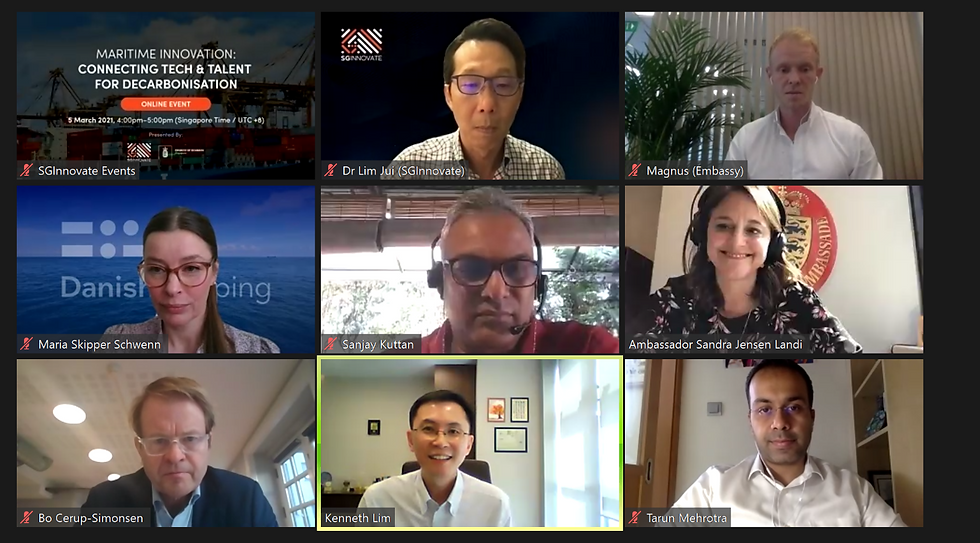"Maritime Innovation: Connecting Tech & Talent For Decarbonisation", event summary
- Green Denmark in Southeast Asia

- 12 Jan 2023
- 4 menit membaca
On March 5th, close to 100 partners, friends and maritime innovators zoomed in on tech and talent for decarbonisation. In the following article, we summarise main take-home messages from the event hosted by the Royal Danish Embassy in Singapore and GreenDKinSEA community member SGInnovate. You may also access the full recording here

The speakers' line-up consisted of:
HE Sandra Jensen Landi, Ambassador of Denmark to Singapore
Dr Lim Jui, CEO, SGInnovate
Dr Bo Cerup-Simonsen, CEO, Mærsk Mc-Kinney Møller Centre for Zero Carbon Shipping
Kenneth Lim, Assistant Chief Executive (Industry), Maritime and Port Authority of Singapore (MPA)
Maria Skipper Schwenn, Executive Director - Security, Environment and Maritime Research, Danish Shipping
Dr Sanjay Kuttan, Executive Director, Singapore Maritime Institute
Tarun Mehrotra, Director, Rainmaking
Access the programme and speaker's profile here
Welcome by CEO of SGInnovate, Dr Lim Jui and opening remarks by H.E Sandra Jensen Landi, Ambassador of Denmark to Singapore
Dr Lim Jui stressed the importance of decarbonisation, and climate change on a broader scale, as a critical issue in the collaboration between Singapore and Denmark. Across many areas, Singapore's Green Plan 2030 and Denmark's long tradition of developing concrete and collaborative models for green transition were highlighted as key pathways to jointly push for decarbonisation in a hard-to-abate industry like maritime. More notably, initiatives to pioneer green fuels and hydrogen powered vessels to support the International Maritime Organisation IMO objectives of halving GHG-emission by 2050 against 2008-levels.
In her opening remarks, Ambassador Landi underlined the agenda's importance with reference to many considering decarbonisation being the greatest maritime challenge of this decade. In Denmark, decarbonisation and green transition has a place in almost every discussion. Last year, the Danish government made a commitment to reduce Denmark’s GHG emissions with 70 pct. by 2030 from 1990-levels and to become climate neutral before 2050. This is extremely ambitious, but we are committed to reach the goals. Shipping, as a hard-to-abate sector, is crucial and a priority of ours. We plan to have the first ocean-going zero emission vessel in commercial operation by 2030. This is already an ambitious target, but two weeks ago, Maersk actually announced that they expect to operate the world’s first carbon neutral liner vessel by 2023 – seven years ahead of schedule.
Furthermore, H.E Sandra Jensen Landi emphasized three high-impact initiatives originating from the Climate Partnership between the Danish Government and the maritime industry:
Plans to build a hydrogen and e-fuel production facility at industrial scale placed in Greater Copenhagen
Plans to build Europe’s largest Power-to-X-facility on the Danish west coast to convert power from offshore wind turbines to green ammonia. Copenhagen Infrastructure Partners and Danish market leaders within agriculture and shipping are behind this.
The recent establishment of the Maersk Mc-Kinney Møller Center for Zero Carbon Shipping to accelerate the development of new green technologies and fuels.
During the debate, the panellists discussed some of the overarching themes revolving around decarbonisation of shipping, such as technology, talent and policy interventions. You can find a spread of highlights and takeaways from the discussion below:
Are green fuels enough?
This is a bigger challenge than replacing fuel. Our entire energy system must be transformed and the new energy sources are going to be scarcer and more expensive. This will drive optimisation in the maritime industry as we phase in green fuels, underlined by Dr. Bo Cerup-Simonsen.
How can countries come together to make best use of resources?
We have talent in Singapore but we may not have critical mass. We need to think of different and imaginative ways of mobilizing talent where physical presence is not required. Most importantly there has to be a will to collaborate, Dr. Sanjay Kuttan shared.
How will digitalisation transform the Maritime sector?
Among the many historical artifacts and legacy systems in the maritime sector, there is a huge unmet potential for leveraging on data. As digitalization becomes more rooted and widespread, business models, outdated documents, and agreements will change. The 174 member states of IMO hold the key to making things happen but we need to ensure that new initiatives don't end up in a discussion of developed vs undeveloped countries, said Maria Skipper Schwenn.
How to attract new talent and ensure talent mobility between sectors?
There's no doubt that we need innovators and start-ups from outside the industry. And a regulatory sandbox to make sure innovation can happen, as shared by Kenneth Lim.
New skills and knowledge must be created in order to transition safely. But at the same time we need people who understand "the old" in order to facilitate "the new", Dr Sanjay Kuttan added.
What about safety?
We will face dilemmas along the way when speed is of the essence. But safety remains the top priority and we will never take a wild bet, Dr. Bo Cerup-Simonsen highlighted.
Are there enough regulations?
We are not doing enough, and efficiency targets will never be enough to reach the 2050 reduction targets, Maria Skipper Schwenn shared.
Final remarks
During the final round of remarks, all participants focused on collaboration for progress. Echoed across the room, partners from both Singapore and Denmark invited all green innovators to team-up and adopt a collaborative and purposeful thinking to develop concrete solutions.
Both sides expressed an encouraging outlook for concrete progress and developments within the next 12 - 24 months. To learn more about the initiatives and Singaporean-Danish objectives to connect tech and talent for decarbonisation, all interested parties are encouraged to get in touch with the panelists listed above.
Get in touch with the event partners to join similar events in the future:
Jodi Lee, SGInnovate, at jodi@sginnovate.com
Mark Edward Perry, Royal Danish Embassy in Singapore, at markpe@um.dk




Komentar